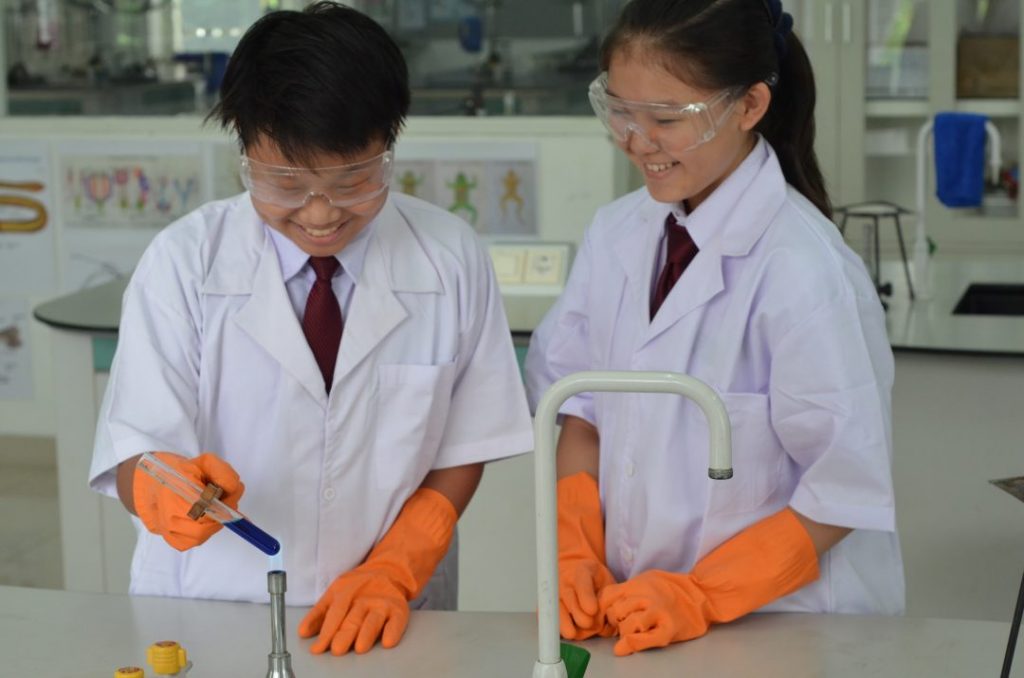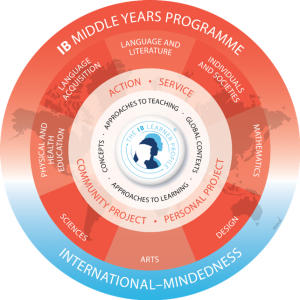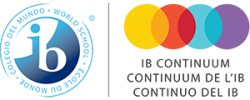Middle School

The Middle Years Programme (MYP) of Sekolah Victory Plus is for students from Grade 7 to Grade 10.
Middle School students study 8 subject groups [Language Acquisition (English, Bahasa Indonesia, Mandarin), Language and Literature (Bahasa Indonesia, English), Individuals and Societies, Mathematics, Sciences, Arts, Design, and Physical and Health Education] that aim to develop attitudes, understanding, skills and knowledge so that students can relate subject content to the real world, allowing development of an awareness of broader and more complex global issues.
At the end of the MYP (Grade 10), students complete their individual Personal Project to culminate learning. The project may take the form of an essay, an artistic production or other forms of expression.

MYP Programme Model
The programme model shows that the Learner Profile is the centre of the MYP – if students have good personal qualities, they will achieve academic success. The learner profile is embedded in the way teaching and learning happens – students learn about the concepts or “big ideas” that are the foundation of their studies, using 21stcentury skills.
Students in the MYP receive a balanced and holistic education through the study of the common core subjects listed below.
Table 2. Academic studies program for Grade 7 to 9
| SUBJECT | PERIODS |
| 7-9 | |
| Bahasa Indonesia | 4 |
| English | 5 |
| Mandarin | 3 |
| Mathematics | 5 |
| Science (integrated) | 6 |
| Biology | – |
| Chemistry | – |
| Physics | – |
| Individual and Societies (integrated) | 4 |
| Geography | – |
| Sociology | – |
| Economics | – |
| Business Studies | – |
| Physical and Health Education | 3 |
| Performing/Visual Arts | 3 |
| Design (Computer / Product Technology) | 3 |
| Religion | 2 |
| Additional program: PSEL & Support Center | 2 |
| TOTAL PERIODS | 40 |
MYP 5 or Grade 10 receive a slightly adjusted study programme while still maintaining the MYP expectations. This final grade of MYP also serves as the preparation both for National and Diploma Programme and therefore is developed to accommodate those who would like to continue to either one of the programmes.
Table: Grade 10 Studies Program
| Subject | Periods |
| General | |
| 1. Agama (Religion) | 3 |
| 2. Pendidikan dan Kewarganegaraan (Civics) | 2 |
| 3. Bahasa dan Sastra Indonesia | 4 |
| 4. Mathematics | 5 |
| 5. English | 5 |
| 6. Physical Education | 3 |
| 7. Design and Technology / Information and Communication Technology | 3 |
| 8. Music / Visual Art | 3 |
| 9. Mandarin | 2 |
| 10. Sciences (Carousel: Physics, Chemistry, Biology) | 6 |
| 11. Individual and Societies (carousel: Economics, Sociology, Business Management) | 5 |
| Total | 41 |
ASSESSMENT in MYP
What is assessment?
In general terms, assessment is the process of gathering, interpreting and describing information about the students’ achievement.
Assessment provides information:
- About knowledge and skills acquired by the student
- For the student about his/ her academic progress
- For the teacher about student achievement of course objectives
- For the teacher about the progress of a student during a period of time
- For the teacher in determining the direction of future study
Assessment makes explicit aspects of a subject, provides feedback, redirects attention to particular areas to increase mastery, consolidates learning skills and enables student self-assessment.
Assessment is not setting barriers for students to get by or finding ways to trick them into making mistakes. It is about finding out what students know and can do, and how well they know and can do.
When and How assessment is done
- Continuous or Formative assessment
This is assessment done during each unit, and helps the teacher and students plan for better learning.
- Summative assessment
This is assessment done at the end of a unit, and measures how well the student has learned in relation to the subject objectives.
What assessment strategies do teachers use?
- Observations
All students are observed often and regularly, so that teachers can give feedback, support them, and take note of their understanding
- Performance Assessment
Performance assessment is the demonstration of capacity to do the work in hand, be it cognitive, creative, physical or social. Performance assessment is applicable in all subjects and is based upon observable criteria. Audio, video and narrative records, as well as rubrics, are often useful for this kind of assessment.
- Project Assessment
Projects in secondary school are seen as opportunities for students to be highly self-directed when students have plan and execute ways to accomplish their task, starting from choosing the topic, doing research, compiling information and presenting their work in a variety of ways.
- Process–focused Assessments
The students’ approaches to learning skills are observed often and regularly and the observations are usually recorded.
- Portfolio Assessment
Portfolio assessment is founded upon teachers and students making judgments about learning based on a rich variety of evidence. A portfolio may consist of a collection of evidence of the progress of that student’s learning in a specific curriculum area or it may be a record of achievement that celebrates the student’s learning and is a demonstration of that learning.
- Selected Responses
These are single occasion, one dimensional exercise. Tests and quizzes are the most familiar examples of this form of assessment.
- Open-ended Tasks
These are situations in which children are presented with a stimulus and asked to communicate an original response. The answer must be a brief written answer, a drawing, a diagram or a solution.
What Assessment Tools Do Teachers Use?
In the secondary school, assessment tools are usually shared with students before the assessment task begins, so that students are clear about the criteria for success.
- Rubrics
Rubrics are established sets of criteria used for rating student’s performance. It contains performance criteria that describe the standards that are assessed. Rubrics provide students with clear performance targets, descriptions of elements of quality, criteria for evaluating and improving work and knowledge of how their work will be evaluated.
- Anecdotal Records
Anecdotal records are brief written notes based on observations of students. These records need to be systematically compiled and organized.
- Journals
Some subjects require the maintenance of a journal. In these curriculum areas the journal developmental workbook. Teacher uses this as a means to assess the process from the beginning until the end of a finished work. Journals also allow students self-assessment and reflection.




